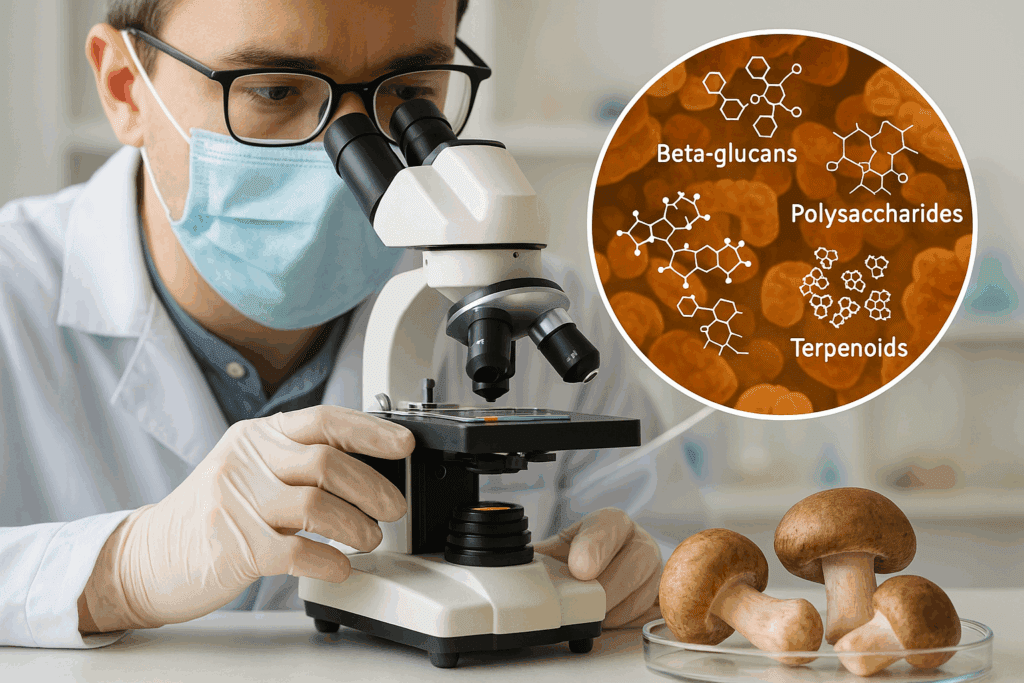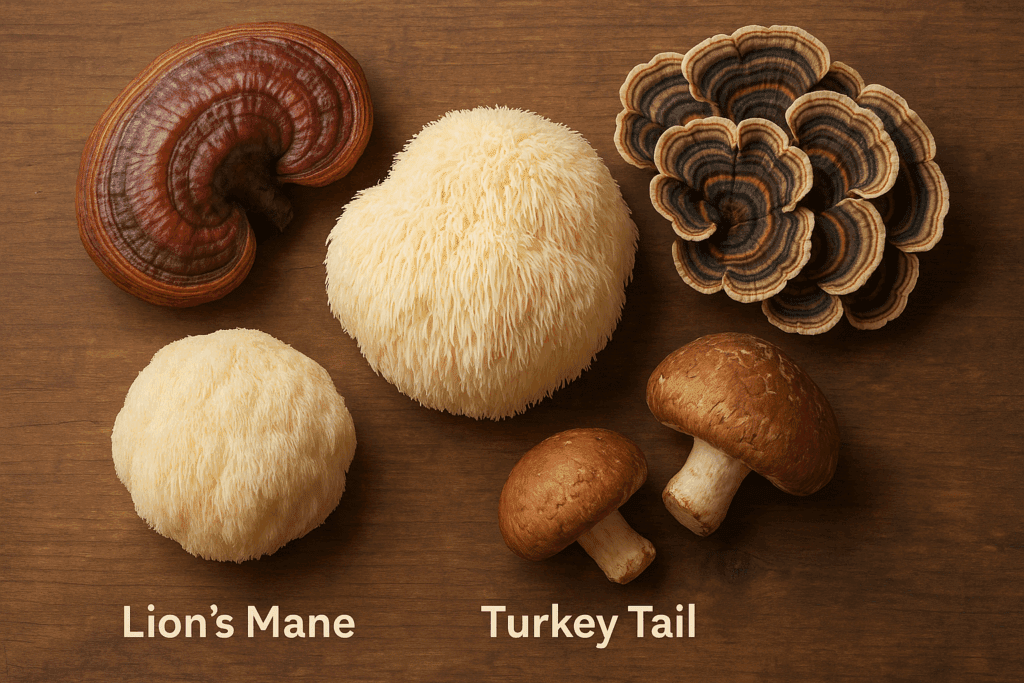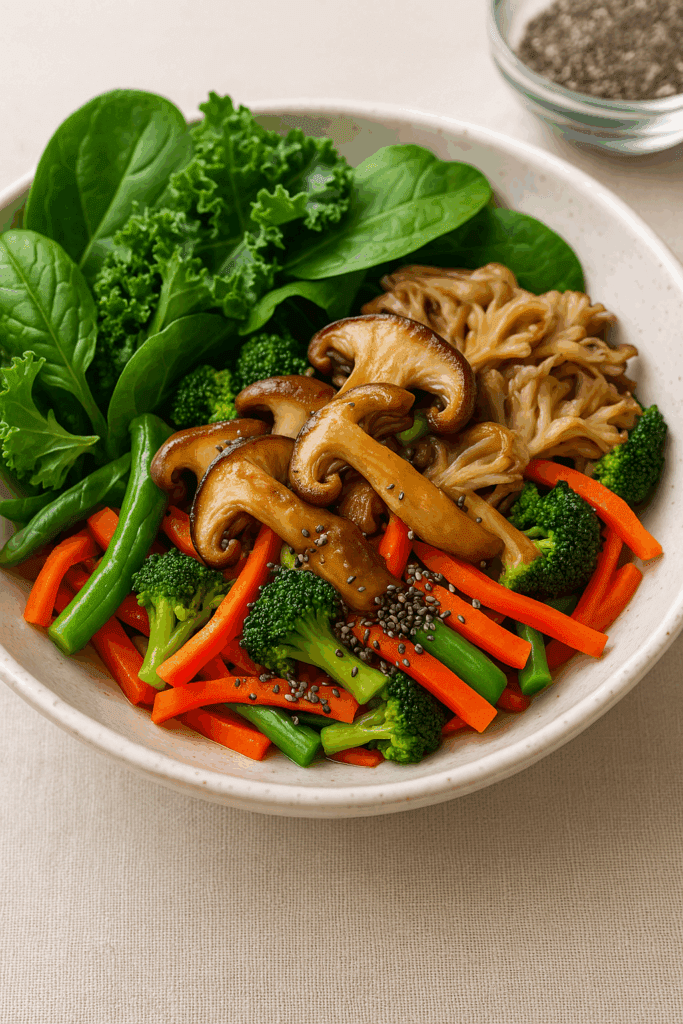Introduction: The Rising Interest in Mushrooms for Inflammation and Wellness
In the realm of natural health and wellness, few ingredients have captured the attention of researchers and health enthusiasts alike quite like medicinal mushrooms. Once relegated to ancient remedies and folklore, mushrooms are now being rigorously studied for their bioactive compounds and potential health benefits, particularly their anti-inflammatory properties. As chronic inflammation is increasingly recognized as a root cause of numerous diseases—ranging from autoimmune disorders to cardiovascular conditions—the search for natural solutions has intensified. Within this context, many are asking: are mushrooms anti inflammatory, and if so, which varieties offer the most potent support? This article delves deep into the current scientific understanding, exploring the best mushroom for inflammation, addressing questions like “do mushrooms cause inflammation” and “can mushrooms cause inflammation,” and shedding light on how these remarkable fungi may enhance both gut and immune health.
You may also like: How Lion’s Mane Supplements May Support ADHD and Cognitive Clarity: What Science Says About Lions Mane for Focus and Brain Health
Understanding Inflammation: A Necessary but Double-Edged Sword
Inflammation is often portrayed negatively, but it is important to recognize that it serves a vital role in the body’s defense mechanisms. Acute inflammation is the body’s immediate response to injury or infection, aimed at eliminating harmful agents and initiating healing. However, when inflammation becomes chronic—persisting even when the initial trigger is gone—it can lead to tissue damage and contribute to a range of health issues, including arthritis, diabetes, depression, and neurodegenerative diseases. Chronic low-grade inflammation often operates silently, compounding damage over time and setting the stage for serious illness. In this context, the question “do mushrooms help with inflammation” becomes highly relevant, as many people are searching for natural strategies to moderate their inflammatory responses without relying exclusively on pharmaceuticals.

Bioactive Compounds in Mushrooms: Nature’s Anti-Inflammatory Arsenal
When exploring why mushrooms for inflammation have garnered such attention, it is essential to examine their biochemical profile. Medicinal mushrooms contain a variety of bioactive molecules, including beta-glucans, polysaccharides, terpenoids, phenolic compounds, and sterols, many of which demonstrate potent anti-inflammatory effects. Beta-glucans, for example, are known to modulate immune responses, balancing immune activity to prevent both underreaction and overreaction. Likewise, compounds such as ergothioneine and hericenones found in certain mushrooms possess antioxidant properties that protect cells from oxidative stress—a key driver of chronic inflammation. Given this rich chemical diversity, it is unsurprising that increasing research supports the idea that mushrooms are anti inflammatory agents capable of influencing complex biological pathways involved in health and disease.

Are Mushrooms Anti-Inflammatory? What the Science Says
Scientific research increasingly supports the notion that mushrooms are anti inflammatory, though effects can vary depending on the mushroom species and preparation methods. Studies on Reishi (Ganoderma lucidum) have shown it can inhibit pro-inflammatory cytokines such as TNF-alpha and IL-6, markers often elevated in chronic disease states. Similarly, Lion’s Mane (Hericium erinaceus) has demonstrated the ability to reduce levels of inflammation associated with neurodegeneration. Notably, Turkey Tail (Trametes versicolor) has been found to enhance immune modulation, supporting a balanced inflammatory response rather than outright suppression. These findings suggest that medicinal mushrooms may offer a more sophisticated means of managing inflammation, potentially avoiding some of the side effects associated with conventional anti-inflammatory medications. As interest grows, it becomes increasingly important to understand which varieties offer the best results and how to incorporate them into a health-supportive lifestyle.

Do Mushrooms Cause Inflammation? Clearing Up the Confusion
Despite their many benefits, some individuals express concern and ask: do mushrooms cause inflammation, or can mushrooms cause inflammation under certain conditions? Generally speaking, medicinal mushrooms do not cause inflammation when consumed appropriately. However, individuals with specific sensitivities, mold allergies, or compromised immune systems could experience adverse reactions. In rare cases, contaminants in low-quality mushroom products—such as molds, mycotoxins, or pesticides—might provoke inflammatory responses. Therefore, sourcing high-quality, well-tested mushroom products is critical for those seeking anti-inflammatory benefits without unintended side effects. For the vast majority, mushrooms are good allies in the battle against inflammation rather than contributors to it.
Best Mushroom for Inflammation: A Deep Dive into Top Contenders
Identifying the best mushroom for inflammation requires an understanding of the unique strengths of different species. Reishi is often considered the gold standard, revered for its calming effects on the immune system and its ability to promote systemic balance. Its triterpenes are particularly potent in suppressing inflammatory pathways. Meanwhile, Lion’s Mane offers dual benefits, not only reducing inflammation but also promoting nerve regeneration and cognitive resilience. Chaga (Inonotus obliquus) presents another compelling option, packed with antioxidants like superoxide dismutase (SOD) that help neutralize oxidative stress. Turkey Tail shines for its immune-modulatory effects, encouraging a healthy inflammatory balance rather than indiscriminate suppression. Shiitake (Lentinula edodes) rounds out the list, boasting lentinan, a beta-glucan known for supporting immune system integrity and mitigating inflammation. Choosing the best mushroom for inflammation ultimately depends on individual health goals, symptom patterns, and overall wellness strategies.
Mushrooms, Gut Health, and Inflammation: An Intricate Connection
Emerging research highlights the pivotal role of gut health in regulating systemic inflammation, further emphasizing why mushrooms for inflammation deserve a closer look. The gut microbiome—home to trillions of bacteria—influences immune function, metabolic health, and even mood. Disruptions in gut microbiota, often referred to as dysbiosis, can trigger widespread inflammation. Fortunately, certain mushrooms act as prebiotics, nourishing beneficial gut bacteria and fostering a balanced microbial ecosystem. Beta-glucans, in particular, selectively stimulate the growth of probiotic strains like Lactobacillus and Bifidobacterium, promoting a gut environment that naturally suppresses inflammatory processes. Therefore, answering “do mushrooms help with inflammation” necessitates considering their microbiome-modulating effects, which play a crucial intermediary role in promoting systemic wellness.
Can Mushrooms Cause Inflammation? A Nuanced Perspective
While the overarching evidence supports the anti-inflammatory potential of mushrooms, it is responsible to acknowledge that under rare circumstances, certain mushrooms can cause mild inflammatory responses. These responses are typically not due to the mushroom’s intrinsic properties but rather external factors such as product contamination, allergic sensitivity, or excessive dosage. Individuals with autoimmune conditions, for instance, may need to consult healthcare professionals before introducing powerful immune-modulating mushrooms like Reishi or Turkey Tail. However, when high-quality products are used correctly and individual sensitivities are respected, the risk that mushrooms cause inflammation is exceedingly low compared to the profound benefits they can offer. This nuanced understanding underscores the importance of personalized nutrition and informed supplementation choices.
Practical Applications: Integrating Mushrooms for Inflammation Into Daily Life
Incorporating mushrooms for inflammation into daily life can be both simple and enjoyable. Culinary mushrooms such as Shiitake and Maitake can be included in meals to deliver gentle, everyday support. For more concentrated therapeutic benefits, mushroom supplements—in the form of powders, tinctures, or capsules—offer a convenient alternative. Functional mushroom blends targeting inflammation often combine Reishi, Chaga, and Turkey Tail for synergistic effects. Timing also matters; some experts recommend consuming mushrooms with meals rich in healthy fats to enhance the bioavailability of fat-soluble compounds. Adopting a holistic approach—pairing mushroom supplementation with an anti-inflammatory diet rich in leafy greens, omega-3 fatty acids, and fermented foods—can further amplify results. As always, consistency is key to unlocking the full potential of these remarkable fungi.

Frequently Asked Questions: Mushrooms and Inflammation
1. How do mushrooms for inflammation interact with stress-related inflammatory pathways?
Mushrooms for inflammation may offer a unique benefit in mitigating stress-related inflammatory responses. Chronic psychological stress often triggers the overproduction of cortisol, which can disrupt immune balance and elevate systemic inflammation. Certain mushrooms, such as Reishi and Cordyceps, contain adaptogenic compounds that may help regulate cortisol levels, indirectly reducing inflammatory markers. When individuals ask “do mushrooms help with inflammation,” it is essential to highlight that their ability to moderate the stress response can play a pivotal role in calming hidden inflammation. This dynamic suggests that integrating mushrooms for inflammation into stress management protocols may yield compounded health benefits over time.
2. Are mushrooms anti inflammatory enough to replace NSAIDs for chronic conditions?
While the idea is compelling, mushrooms for inflammation are not currently positioned as full replacements for nonsteroidal anti-inflammatory drugs (NSAIDs) in treating chronic inflammatory diseases. However, their long-term use may complement medical treatments by helping to reduce baseline inflammation naturally. For example, Reishi’s triterpenes and Chaga’s antioxidants provide gentle, systemic support without the gastrointestinal risks often associated with NSAIDs. When discussing whether “are mushrooms anti inflammatory enough” for therapeutic substitution, it is important to advise that any medication adjustments should only be made under medical supervision. Still, the evidence does support mushrooms as valuable adjuncts in holistic anti-inflammatory strategies.
3. Does mushrooms cause inflammation when consumed raw?
The question “does mushrooms cause inflammation when eaten raw” is a nuanced one. Raw mushrooms, particularly common culinary types like white button mushrooms, contain compounds like agaritine, which some studies suggest could be toxic in very high amounts. Though cooking significantly reduces agaritine levels, individuals consuming large amounts of raw mushrooms regularly may risk a mild inflammatory reaction. Therefore, for those seeking the anti-inflammatory benefits of mushrooms for inflammation, lightly cooking or choosing high-quality extracts is generally advisable. This small but crucial preparation detail enhances safety while maximizing health benefits.
4. What future innovations might enhance the anti-inflammatory effects of mushrooms?
Exciting innovations in biotechnology are poised to amplify how mushrooms for inflammation are utilized. Researchers are investigating ways to bioengineer mushrooms to concentrate higher levels of anti-inflammatory compounds like polysaccharides and triterpenes. Additionally, advances in precision fermentation could allow for the development of purified extracts targeting specific inflammatory pathways without the need for consuming whole mushrooms. In this evolving landscape, the conversation around “are mushrooms anti inflammatory” will likely shift toward increasingly specialized, potent formulations. Personalized mushroom therapies based on an individual’s microbiome or genetic markers could soon redefine the future of natural inflammation management.
5. Can mushrooms cause inflammation if taken with certain medications?
Under some circumstances, mushrooms for inflammation could theoretically interfere with medications that suppress immune activity or thin the blood. For instance, Reishi has mild anticoagulant properties, so combining it with pharmaceutical anticoagulants could pose a risk of excessive bleeding. While such interactions are rare, they bring nuance to the discussion of “can mushrooms cause inflammation or complications.” Patients on immunosuppressive therapies or anticoagulants should consult a qualified healthcare provider before introducing medicinal mushrooms. The takeaway is not that mushrooms are inherently dangerous but that their powerful biological effects warrant respectful, informed use.
6. How does the best mushroom for inflammation vary across different health goals?
Identifying the best mushroom for inflammation depends heavily on an individual’s specific health objectives. For example, someone aiming to improve cognitive resilience might favor Lion’s Mane, given its dual action against neuroinflammation and cognitive decline. In contrast, an individual with gut-related inflammation may benefit more from Turkey Tail due to its potent microbiome-supportive properties. This diversity underscores why asking “what is the best mushroom for inflammation” cannot yield a one-size-fits-all answer. Instead, personalized selection enhances the effectiveness of mushroom-based strategies for inflammation control.
7. Do mushrooms help with inflammation at the cellular level?
Emerging evidence suggests that mushrooms for inflammation do exert effects at the cellular level, particularly in regulating gene expression related to inflammatory pathways. Beta-glucans from mushrooms can influence the activity of NF-κB, a protein complex that plays a central role in initiating inflammatory responses. Moreover, mushrooms like Chaga are rich in antioxidants that protect cellular structures from oxidative stress—a primary driver of chronic inflammation. Thus, when considering “do mushrooms help with inflammation,” it is important to recognize that their influence extends deep into cellular processes, offering protective benefits that begin at the microscopic scale. This cellular resilience builds the foundation for systemic health.
8. Do mushrooms cause inflammation in autoimmune conditions?
Individuals with autoimmune diseases often wonder: “do mushrooms cause inflammation” or worsen immune dysfunction? The answer depends on the mushroom type and the individual’s immune profile. Some mushrooms, like Reishi and Turkey Tail, help regulate rather than overstimulate the immune response, making them generally safe for autoimmune conditions when used thoughtfully. However, overly stimulating varieties or inappropriate dosages could theoretically provoke unwanted immune activity. For those with autoimmunity seeking the benefits of mushrooms for inflammation, personalized guidance from an integrative health provider is highly recommended to maximize benefits and minimize risks.
9. How does the cultivation method impact mushrooms for inflammation?
Not all mushroom products are created equal, and cultivation methods significantly affect their efficacy for inflammation support. Mushrooms grown on nutrient-rich wood substrates tend to produce higher concentrations of beneficial compounds compared to those grown on grains. Additionally, organic cultivation ensures that mushrooms are free from pesticide residues that could trigger unwanted inflammatory reactions. When evaluating whether “are mushrooms anti inflammatory” in practice, sourcing becomes just as critical as species selection. Investing in high-quality, properly cultivated mushrooms amplifies their therapeutic potential while safeguarding against unintended side effects.
10. Can microdosing mushrooms provide anti-inflammatory benefits?
Although much of the microdosing conversation revolves around psychedelic mushrooms, there is growing curiosity about microdosing non-psychoactive mushrooms for inflammation. Low, consistent doses of functional mushrooms such as Reishi or Lion’s Mane may help maintain steady-state support for the immune system and inflammatory regulation without overwhelming the body. This emerging practice aligns with the broader question of “can mushrooms cause inflammation or prevent it,” highlighting a nuanced, preventative approach. Early anecdotal reports suggest that microdosing could offer a subtle yet meaningful way to enhance resilience against chronic inflammation. Rigorous clinical studies are still needed, but the future looks promising for low-dose mushroom protocols in wellness strategies.

Conclusion: Are Mushrooms Anti-Inflammatory Allies for Gut and Immune Health?
In light of extensive emerging evidence, the answer to “are mushrooms anti inflammatory” is a resounding yes—provided they are sourced, selected, and consumed thoughtfully. Far from causing harm, mushrooms for inflammation offer a holistic, natural pathway toward regulating immune function, enhancing gut health, and counteracting the silent fires of chronic inflammation. Whether exploring the best mushroom for inflammation for targeted support or simply seeking to enrich the microbiome through dietary inclusion, medicinal mushrooms stand out as powerful allies. While rare instances of sensitivity exist, these can usually be mitigated through careful selection and professional guidance. Ultimately, incorporating mushrooms into a broader anti-inflammatory lifestyle offers a compelling, research-backed strategy for fostering resilience, vitality, and long-term well-being.
Was this article helpful? Don’t let it stop with you. Share it right now with someone who needs to see it—whether it’s a friend, a colleague, or your whole network. And if staying ahead on this topic matters to you, subscribe to this publication for the most up-to-date information. You’ll get the latest insights delivered straight to you—no searching, no missing out.
Further Reading:
Anti-inflammatory properties of edible mushrooms: A review
Medicinal Mushrooms: Bioactive Compounds, Use, and Clinical Trials
Mushrooms: A Potential Natural Source of Anti-Inflammatory Compounds for Medical Applications
Important Note: The information contained in this article is for general informational purposes only, and should not be construed as health or medical advice, nor is it intended to diagnose, prevent, treat, or cure any disease or health condition. Before embarking on any diet, fitness regimen, or program of nutritional supplementation, it is advisable to consult your healthcare professional in order to determine its safety and probable efficacy in terms of your individual state of health.
Regarding Nutritional Supplements Or Other Non-Prescription Health Products: If any nutritional supplements or other non-prescription health products are mentioned in the foregoing article, any claims or statements made about them have not been evaluated by the U.S. Food and Drug Administration, and such nutritional supplements or other health products are not intended to diagnose, treat, cure, or prevent any disease.


